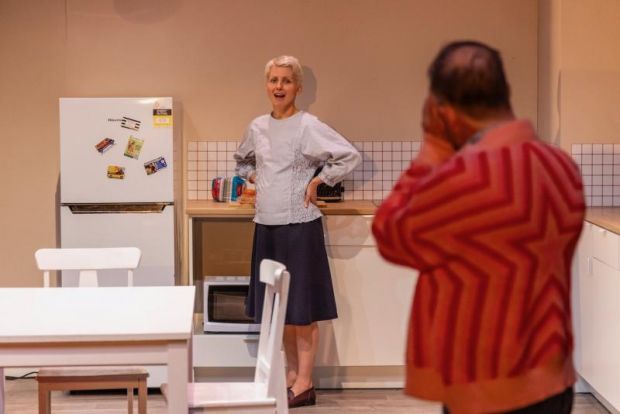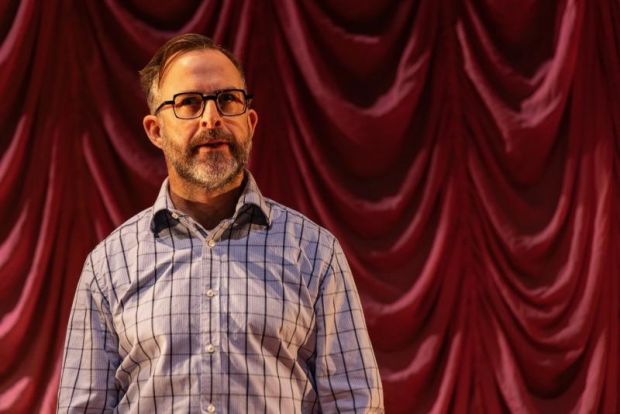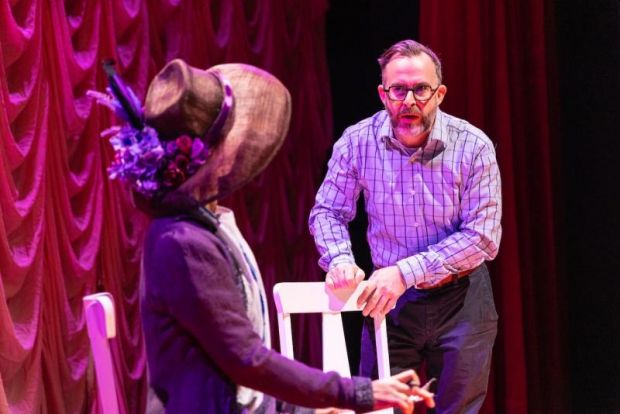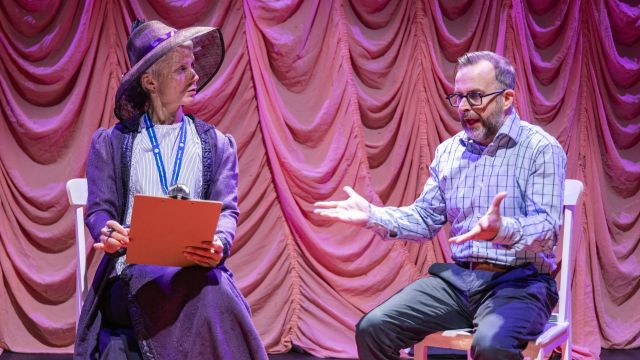The Platypus
This bold mix of genres and blatant artifice delivers a witty, delightful, entertaining – if finally melancholy – evening. Rebecca Bower and John Leary are wonderful; they ring the many changes, playing multiple roles with huge assurance, never faltering.
In a play within a play, a sadly familiar married couple, Jessica and Richard (Bower and Leary) go through the morning ritual: making the school lunch, getting the coffee, getting the kid ready for school. Did you phone your mother? Can you pick up my prescription? Did you put your washing in the machine? Etc. They’re speaking across a chasm; they’re harried, fractious, brittle, impatient, not really communicating anymore… This scene – or variations on it – which lies at the heart of The Platypus, recurs three times. Each time, more problems emerge…

Jessica and Richard are surrounded by other characters (all played by Bower and Leary), with their own problems and possibilities. There’s the attractive guy at work; there’s the attractive Mum at the school gate when you drop the kid off…
And the question The Platypus poses is how do people today – that is, we, the audience – deal with these problems and tempting possibilities? How do we make them bearable? How do we even see them?
Playwright Francis Greenslade’s real originality lies in two things. First, he makes us contemplate these questions by never letting us forget that we are watching a play – and it’s more fun than Brecht’s V-effect even if the intention is the same. Even when Jessica and Richard are at their most naturalistic, they are types, representatives. The theatricality of the show is undisguised. There’s no fourth wall. Sarah Tulloch’s set has a floor-to-ceiling red velvet theatre curtain in front of which there is a row of old-fashioned footlights. Scene and location changes are indicated by Claire Springett’s inventive lighting that ripples across the stage like movie dissolves.

The show begins with another couple (but Bower and Leary up first) shuffling along a row to their seats to see a show. He doesn’t want to be there. She asks him to try and stay awake. He sees someone he knows a few rows ahead. It’s… Richard. Where’s Jessica? Of course, the play we then see is the play they’ve come to see… And when, in scene 2, we meet ‘Richard’, we get it – it’s going to be like this.
Behind that velvet curtain there’s another - a tatty pink scalloped old cinema curtain, and inside that again is Jessica’s and Richard’s cold, white naturalistic kitchen. Scene changes are affected too by the very perky Stage Manager, Joanna Halliday, rearranging the furniture, or offering a prop – always visible, polite and smiling.
But Greenslade goes further in leading us to contemplate that question of how do we deal with all those shocks that flesh is heir to.

We deal with them – or try to – through art in all its varieties and so here the tale of Richard and Jessica involves transformations. Their parlous situation is seen through different lenses - as, say, how Shakespeare might render it the dialogue – or as if it were Restoration comedy, or American sit-com, or as Pinteresque tension, or screwball comedy… And, finally, Beckett. Greenslade doesn’t exactly quote, but we recognise the tropes (true, The Platypus is more fun for theatre mavens and pop culture afficionados but there’re tip-off clues) and they are used cleverly and pointedly. We laugh at the wit of it, but there’s always an undercurrent of clever desperation, of ‘this won’t help either…’
In one scene, Bower and Leary take what might have been a scene from Hawks’ immortal His Girl Friday - it’s immediately recognisable and Leary does a very creditable Cary Grant - but it’s a scene from years later. Now Hildy and Walter Burns have split. All the wit in the world didn’t help them either.
Francis Greenslade has had a lot of fun writing this show – and we have a lot of fun seeing it. Afterwards, or even as we experience its very last moment, we might realise just how sad and grown-up it all is.
Michael Brindley
Photographer: Mark Gambino
Subscribe to our E-Newsletter, buy our latest print edition or find a Performing Arts book at Book Nook.

